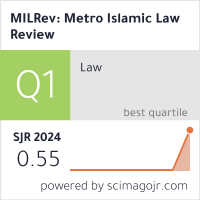Contemporary Islamic Politics in Tunisia: The Journey of Islamic Democracy Post-Arab Spring
DOI:
https://doi.org/10.32332/milrev.v3i1.8976Keywords:
Arab Spring, Contemporary Islamic, Democracy, Politics.Abstract
This study aimed to examine contemporary Islamic politics in Tunisia, specifically the democratic system Post-Arab Spring. The political struggle of Muslim countries triggered the Arab Spring movement, with Tunisia pioneering a Jasmine Revolution from 2010-2011 to obtain global attention. Furthermore, the investigation constitutes a literature review to analyze contemporary Islamic politics in Tunisia, specifically Post-Arab Spring. The influence of Islamic politics is an important issue, specifically in strengthening demands for democracy by analyzing the struggle in Tunisia. Therefore, this study provides the main focus of state democracy, which is a phenomenon of historical studies and political struggles. The analysis process is carried out in four stages, namely source finding, criticism, interpretation, and writing. The results show that there is a harmonious coexistence between Islam and democracy in Tunisia compared to other countries in the Middle East. The principles of democracy are evident in the organization of elections, freedom of speech, religious tolerance, and recognition of gender equality.










